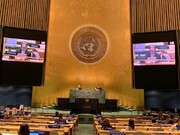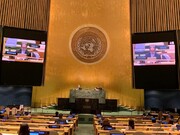Iran’s biennial draft resolution entitled “Follow-up to nuclear disarmament obligations agreed to at the 1995, 2000 and 2010 Review Conferences of the Parties to the NPT” was approved on Thursday October 28 in the First Committee of the UN General Assembly.
The draft resolution would be introduced to the General Assembly next month to be put on a final vote.
In an interview with IRNA correspondent in New York on Sunday, Ravanchi said on the potential timing and mechanisms provisioned in the draft resolution that it was a subject that should be decided on in Review Conferences of the NPT and among nuclear states themselves.
When the NPT was implemented in 1970, Ravanchi said, the nuclear weapons states party to the treaty committed to eliminate their nuclear weapons, but they have refused to accept any timing on political grounds.
He noted that the quality and conditions for possible use of nuclear weapons have changed in contrast to the commitments of nuclear weapons states, although the number of such weapons has decreased.
Asked about security assurances provisioned in Iran’s draft resolution, the diplomat said that there were generally two types of assurances.
Positive security assurance refers to a condition that a nuclear weapons state would help a non-nuclear country when attacked by another nuclear weapons state, Ravanchi explained.
He went on to add that negative security assurance, on the other hand, refers to the condition that a nuclear weapons state wouldn’t attack a non-nuclear country by nuclear weapons.
Iranian envoy in the UN said that the assurance mentioned in Iran’s draft resolution was meant to be negative security assurance, requiring nuclear weapons state to give assurance that they wouldn’t use nuclear weapons against non-nuclear states.
Iran’s draft resolution was approved by 108 yes votes, Ravanchi said, adding that he expected it to be approved even more strongly in the General Assembly.
9416**9417
Follow us on Twitter @IrnaEnglish





Your Comment